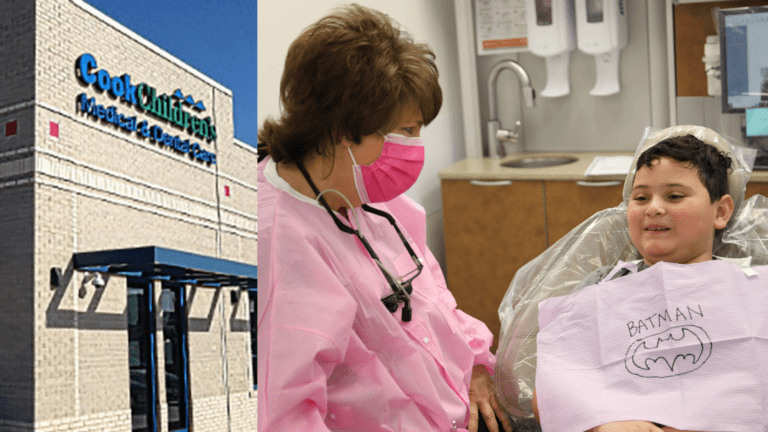By Ashley Antle
A child’s smile has enormous potential for enhancing emotional well-being, communicating happiness and building bonds with others. It can also be a strong indicator of physical health.
“There is a clear connection between oral health and overall mental and physical health,” said Tonya K. Fuqua, DDS, director of oral health for the Community Health Center, led by Cook Children’s. “Teeth can be very indicative of what is going on in a child’s life, the socioeconomic barriers they face and underlying health issues they may have. That’s why it’s so important that children’s dental health is as high a priority as their physical health.”
Connecting the dots between oral and physical health to improve a child’s overall well-being is the goal of a grant awarded by the American Academy of Pediatric Dentistry (AAPD) Foundation to Cook Children’s Health Care System’s Renaissance Neighborhood Health Center and the Community Health Center Save-A-Smile Program. Cook Children’s is one of only two recipients nationwide to receive the grant.
“The AAPD Foundation is dedicated to making dental care accessible to all children by supporting nonprofit clinics that provide daily cleanings, advanced treatments and ongoing care that helps children in need,” said Douglas Keck, DMD, MSHed, president of the AAPD Foundation, a pediatric dentist and a dentist at a Federal Health Center in Florida. “Our support of Save-A-Smile and its medical dental interface initiative represents a pivotal step in bridging the gap between oral health providers and primary care professionals. Working together, we aim to provide sustainable compassionate care to children in need.”
The grant supports a three-year pilot project aimed at developing best practices to bridge the gaps between pediatric medicine and dental care. It paves the way for a community health worker (CHW) to be embedded in the Renaissance Neighborhood Health Center to educate and support families while identifying and addressing any barriers that prevent them from completing care.
Cook Children’s Renaissance Neighborhood Health Center is a primary health care home for children living in southeast Fort Worth. The center has a dental and medical clinic under the same roof, making it the ideal location to conduct the pilot. Many of the center’s patient population are considered financially vulnerable and qualify for government-supported health programs such as Medicaid and the Children’s Health Insurance Program (CHIP). They may also face non-medical health factors such as food insecurity, housing problems and adverse childhood experiences.
Making connections
Juanita Valles is the community health worker assigned to this medical/dental integration project at Renaissance.
“Families tell me their problems and I listen,” Valles said. “Right now, everyone is struggling financially. Sometimes they need transportation to appointments, childcare, clothing, help with diapers, car seats for the kids, household items, or even dental care for the parents themselves. That’s where I come in.”
When a family has a need, Valles works to pave the way to make it easier for them to pursue medical and dental care. She even goes so far as to make house calls with her trusty stuffed sidekick, Leo the Lion, as she works to educate a family and overcome obstacles.
“I take Leo with me everywhere I go and use him to show kids how to brush their teeth the right way,” she said. “We also teach them to drink plenty of water and stay away from sugary drinks.”
Children with untreated dental problems often experience difficulty with pain, eating, sleeping, self-esteem, school attendance, and grades. Cook Children’s 2021 Community Health Needs Assessment revealed that more than 175,000, or 1 in 7, children living in Cook Children’s eight-county service area could not get the dental care they needed. This rate is 9 times higher than national estimates and 5 times higher than state estimates. Barriers reported included inadequate dental insurance coverage, difficulty planning, and lack of education and resources for dental care.
“You really alleviate all the barriers by addressing the community service element of why families may not be getting the dental care they need for their children,” Dr. Fuqua said. “And the pediatrician’s office is the perfect place to start, because children often visit their pediatricians more often in the early years of life than they do dentists.”
Leveling Up
Results from the first year of the pilot, which began in January 2023, have already prompted system-wide changes, Dr. Fuqua says. Dental screening questions were implemented throughout the Cook Children’s Health Care System for well-child visits 0 to 3 years of age. Children in the pilot who test positive are linked to the community health worker. Other opportunities to scale up and implement new solutions for year two include streamlining pilot data collection and analysis, improving criteria for patient referrals to the community health worker, and examining system-wide dental screening data.
In the first 10 months of the pilot program, more than 1,000 patients answered dental screening questions during a well-child screening and then scheduled an appointment with the dentist at Renaissance. Of these, 429 patients completed their initial dental appointments at Renaissance. During the same period, Valles attempted or completed contact with families 247 times and provided individualized oral health instruction in person or over the phone to 50 families.
“That’s the beauty of this program and having a health worker in the community,” Dr. Fuqua said. “It’s not as simple as just saying, ‘Oh, your child needs help and here’s where to go.’ These families have so many obstacles and so many reasons why they haven’t taken a child to the dentist, but Juanita and this program makes a way for them.”


